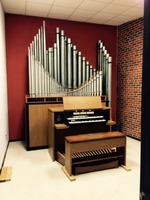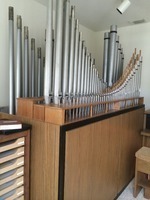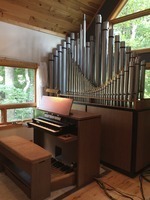A road trip report
 Saturday, December 6, 2014 at 9:00AM
Saturday, December 6, 2014 at 9:00AM My students are Guest Bloggers today. They say:
We live in the Blue Ridge Mountains of North Carolina, and that means we do not live near a big city. We often make up for that by going where the locals call “down the mountain” to attend recitals, Evensongs, workshops, and organ “crawls.” We have enjoyed visits to many organs in Charlotte, Winston-Salem, Burlington, Hickory, and a wonderful all-day crawl in the Duke Chapel, and we are planning future trips farther out-of-state.
In the spring of 2013, we began brainstorming about a different kind of crawl. What if we were to plan a road trip around organ builders rather than organs? It wasn’t long before our teacher, Joby Bell, had identified an area of the country not too far from us that would have several shops along an easy, circular route. After receiving very enthusiastic replies from the builders we hoped to visit, we made our plans and set a date. On June 23, 2013, we embarked on a five-day itinerary to points north in and around Cleveland, Ohio, then westward to Indianapolis, Ind., and Champaign, Ill., then southeast toward Knoxville, Tenn. The following is a short diary of a magnificent week, during which we visited the shops of Schantz Organ Company, Kegg Pipe Organ Builders, The Holtkamp Organ Company, Goulding & Wood Pipe Organ Builders, John-Paul Buzard Pipe Organ Builders, and B. Rule & Company.
Monday, June 24: The entire week was nearly derailed when we discovered the Smucker’s headquarters and factory on our way into Orrville to visit Schantz. But we made the difficult decision to keep to our plan of visiting organ building shops, and on we went! Perhaps our visit to Schantz was the most enlightening. We were already familiar with their work because they have built many organs in our part of the country. But also, with such a huge, comprehensive shop, it was instructive to learn in one place about all aspects of organ building, so that by the time we visited the others, we recognized many more tools, techniques, parts, and jargon. Schantz President Victor Schantz, head pipemaker Neil Jackson, and front officer Darlene Steele were enthusiastic hosts, and we were treated to a full tour and some free goodies afterwards, including CDs and beautiful full-color brochures. We also took Mr. Schantz’s excellent advice to have lunch in downtown Orrville at Heartland Point Café.
Then it was off to the Kegg shop in Hartville, a longer-than-anticipated journey during which we learned that apparently most of Ohio is under construction. But we made it and enjoyed a delightful tour of the shop with Charles Kegg himself guiding the way. The shop had just sent a project “out the door,” which meant that there wasn’t much to see on the floor. But we discussed with Mr. Kegg his tonal philosophies, and he showed us a lot of the beautiful woodworking that is a hallmark of his instruments. The highlight of the shop was a fully assembled Moeller on the floor, being played by original Moeller organ rolls. Mr. Kegg was generous with his time, and we listened to roll after roll. It was for many of us our first experience with player organ mechanisms.
Tuesday, June 25: We spent the morning at Holtkamp’s shop in Cleveland, where we marveled at their beautiful “inner sanctum,” a chapel-like room that was finished with exquisite woodworking and stenciling during the Depression, when Mr. Holtkamp gave unemployed or bored workers something to do. Holtkamp is a large, prolific shop, and we enjoyed seeing room after room full of equipment, supplies, and projects being completed, all with Head Voicer George Cooper as our guide. We got to see pipes being made and soldered, a process that opened our eyes to the meticulous care that goes into building an organ. Pipe making must represent a huge overhead, and we have gained a much greater appreciation for that particular art.
For the afternoon, we enjoyed some unplanned bonuses! Our comrade Jonathan Poe made some calls and managed to get us some time at the Church of the Covenant, Cleveland, and in Severance Hall. Jonathan Moyer, Organist and Director of Music at Covenant, was a most gracious host, taking time out of his day to welcome us unannounced and to allow us as much time as we liked on the E.M. Skinner/Aeolian-Skinner/Holtkamp organ up front and the Richards, Fowkes & Co. organ in the back.
After treating Dr. Moyer to lunch, we walked just down the street to Severance Hall. We were allowed to walk among the organ chambers and admire the console of the E. M. Skinner. We did not get to play, but just being in that splendid, historic space was a treat, and we thank our guide, house Administrative Assistant Laura Clelland, for her time in welcoming us and sitting down to answer our many questions.
We then headed west, destination Indianapolis. On the way, we took a slight detour into Oberlin to walk around and see what Dr. Bell assured us was a beautiful campus. After a snack downtown, we made our way to the Oberlin Conservatory, where we discovered practice organ after practice organ. Mr. Don VerKuilen, Oberlin student, happened upon us and offered to show us the Fisk in Finney Chapel. What a coup! We all played a bit and enjoyed getting to know Don. The entire afternoon was wonderful, filled with extra instruments and beautiful buildings and the kind hospitality of strangers who were not expecting us. Thank you all.
Wednesday, June 26: In the morning, we made our way to Goulding & Wood, where the firm’s Business Manager Phil Lehman took us on a tour. At this shop, we saw our first pipe bathing facility, a fascinating part of long-term maintenance of older organs. Thanks to some scale models of Goulding & Wood’s designs, we also learned more about the inner workings of windchests.
Thursday, June 27: In the morning, we made our way west to Champaign, Ill., to visit the shop of John-Paul Buzard. Service Department Foreman Dave Brown was our guide. Even if he had done nothing else, he should probably win the prize for most gracious host, because he had doughnuts and coffee waiting for us upon our arrival! We thoroughly enjoyed admiring all the interesting consoles and other parts in the organ console “cemetery” in the firm’s warehouse and maintenance/restoration shop a few blocks away from the new construction shop. In the main shop was a large, new instrument about to be dismantled and delivered to its new home across the country. We marveled at how well organized and clean the Buzard shop was, given the fact that it is spread vertically over several stories in an old downtown building. Also in the building are the Organ Loft Apartments, operated by Mr. Buzard. Some of us are ready to move there, if for no other reason than to live in a place called the Organ Lofts!
After our tour, Mr. Brown took us around town to visit the Buzard instrument in the Chapel of St. John the Divine on the University of Illinois campus, the E.M. Skinner at Wesley United Methodist Church in Urbana, and the Wurlitzer at the Virginia Theatre. It was an inspiring day of generous hospitality and introduction to three completely different organs only blocks apart from each other.
Friday, June 28: Our last stop before heading back home was Brad Rule’s shop just east of Knoxville, Tenn. This was the only all-tracker shop we visited, and the differences in some techniques and machinery were fascinating. Mr. Rule walked us through his charming shop, set up in an old church building. His drafting area is in the former chancel, and the main shop is in the old nave. Mr. Rule also trains local students in the art of organ building.
Throughout the week we noticed some rather entertaining sights. In one voicing room, there were figurines of characters from The Simpsons sitting among the pipes. At another shop, a voicer had on his arm a beautiful tattoo of an organ façade. We also saw here and there the usual girlie calendars and funny signs and notices. One shop had a box of drill bits labeled “bits,” with the word “naughty” scribbled above that. In Brad Rule’s shop, we were apprehensive at asking why there was a photo of Chairman Mao on a shelf. Mr. Rule picked up Carl the shop cat, held him up in front of the photo, and said, “Carl, who’s in the picture?!” Carl said, “Mao!” Mr. Rule also had a clever “doorbell.” A visitor pulls a rope hanging outside, which then activates a small wedge bellows inside, which then discharges into three en chamade pipes tuned to the same pitches as the whistle of the freight train that used to pass through the town.
In every shop, we saw familiar techniques, equipment and concepts at work. Even though different shops are different in their approaches, they are all quite similar in their quest for excellence. We wish them all well and thank them so very much for their time.








